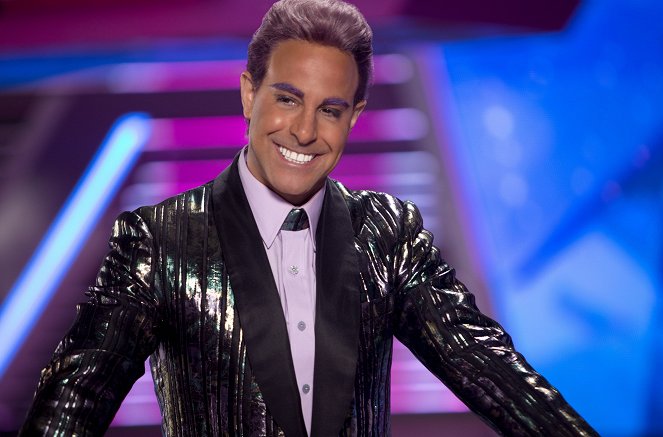Directed by:
Francis LawrenceCinematography:
Jo WillemsComposer:
James Newton HowardCast:
Jennifer Lawrence, Josh Hutcherson, Donald Sutherland, Woody Harrelson, Philip Seymour Hoffman, Jena Malone, Sam Claflin, Jeffrey Wright, Liam Hemsworth (more)VOD (3)
Plots(1)
After her triumph in the Hunger Games, Katniss Everdeen travels through the districts on a Victory Tour while a rebellion gathers steam around her. (Netflix)
Videos (35)
Reviews (15)
Catching Fire is more mature and bearable than the first installment, which I had to suffer through. It’s too long and
brings no satisfying conclusion (it only compels you to watch the next part), but it’s entertaining enough. It’s not a bad
adventure fun for young audiences, and Francis Lawrence’s directorial craftsmanship shows no flaws. The best part of the movie is the epic scenes à la Cleopatra on the Capitol square.
()
Unfortunately, the bar set by the first part also characterizes the second part, although the story could and should have been more interesting, and the names of all the actors are still more than pleasing to hear. Formally almost at the level of the first film, still without much emotion and credibility of the sketched society – everything sounds cold and mechanical, in some passages too spectacular and, in particular, unnecessarily long. The scenes from the arena, which should have been the highlight of the film, act more as a necessary element to fulfil expectations and to create a strong enough stepping stone towards further sequels. And whereas in the first film the romantic chemistry between the central couple worked very well, here their relationship is hindered both by the constant presence of a third party and by overused phrases like "threat to the state" and "embodiment of independence". Fortunately, the visuals and sound design are almost flawless and the final twist is satisfying and hopeful enough to make me respect Catching Fire as a mere prelude and look forward to the coming of the great revolution. But they will need to work a bit harder :) 60%
()
Greater emotional richness, surprising creative courage, and a healthy self-confidence behind and in front of the camera. In most aspects, it's just as complete an explosion as the original (and even my favorite installment). In the wrong hands, it could easily have become a tearful prologue from the first half on, but fortunately, that did not happen. The spark slowly turns into a flame, and when Peeta becomes a clear leader and Johanna steals all the scenes in such limited space, Catching Fire is a winner. Although there isn't too much space devoted to the history of the Quarter Quell or the individual veterans over the extra fast-paced half-hour, thanks to a more coherent picture, it is almost the best film installment. But there would still be more to come.
()
I was really terrified of the two hours and a half of runtime, as I should’ve been. The first 30 minutes passed awfully slowly, I almost thought that I wouldn’t make it through and just give up on the movie. But I still thought that it would somehow get better and I’d start liking it, which happened in the end. Since Katniss made it into another arena, things started to get really fun. Maybe even more fun that in the first movie. From that point on, the remaining two hours flew by like a breeze and the movie suddenly became a successful blockbuster. That’s what made me so skeptical of the final two-piece movie. Because so far, the only thing I found fun about Hunger Games were the arena fights. Everything else from the politics to the war went completely over my head.
()
It’s ridiculous and sad when one reads the reactions to the second instalment of The Hunger Games with a constant stream of disparaging comments because the film is primarily targeted at girls, even though those same people uncritically praise Marvel comic-book movies. In comparison with those, the positive aspects of Catching Fire are readily apparent, dispensing with the prejudices associated with the “chick flick” genre and even showing that, thanks to such books and films, today’s adolescents have much more complex and enriching role models than previous generations. Catching Fire uses the same production concept as top-tier comic-book flicks, so it also has a generous budget, a director who is rather more associated with dramatic titles than with a distinctive creative signature in terms of handling action scenes, and excellent or at least solid actors who give the characters individuality solely through their presence. Whereas in comic-book movies this is a way of humanising half-tone characters who never had more complex character traits but rather represented certain heroic or mythic ideals, here truly ambiguous personalities with far more thoughtful and non-formulaic natures are brought to life. Similarly, whereas comic-book movies draw their sophistication from relating to their own canon, traditional myths and the contemporary socio-political atmosphere, The Hunger Games does not thematise the heroic side of heroism, but its relativity and artificiality, thus revealing that the heroes of today are mere constructs or personalities exploited in the interest of a certain ideology (whether ruling or revolutionary) and then chewed up and spit out by PR specialists and the tabloid press. The heart of The Hunger Games is its central character, Katniss Everdeen, who is not a demigod from another planet, a billionaire dandy or any other kind of privileged pseudo-personality, but an ordinary girl with ambiguous personality traits who came into a world where she is forced to play a certain role. While plans for revolution are cooked up around her and grand speeches about destiny are made, she has her own motivation: an entirely anti-heroic, egocentric effort to ensure that she and her loved ones can get out alive and live their own lives. The conflict between the private and public worlds and between real personalities and marketing constructs form the core of Catching Fire’s narrative, which is strictly defined against the world of superficiality and fleeting glory. That can’t really be said about the stories of privileged heroes living in splendour. Of course, even in The Hunger Games, this criticism is relative and doesn’t reach the harshness or vitriol of biting satires or openly anti-consumerism pamphlets. But that’s not the purpose of the film. Rather, the aim of the film is merely to give young people – not just girls – a positive role model who frees them from the fallacies foisted on them by lifestyle magazines and dully conservatives films and series.
()
(less)
(more)



Ads